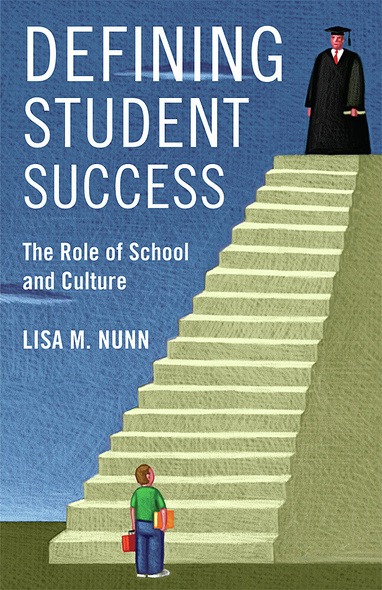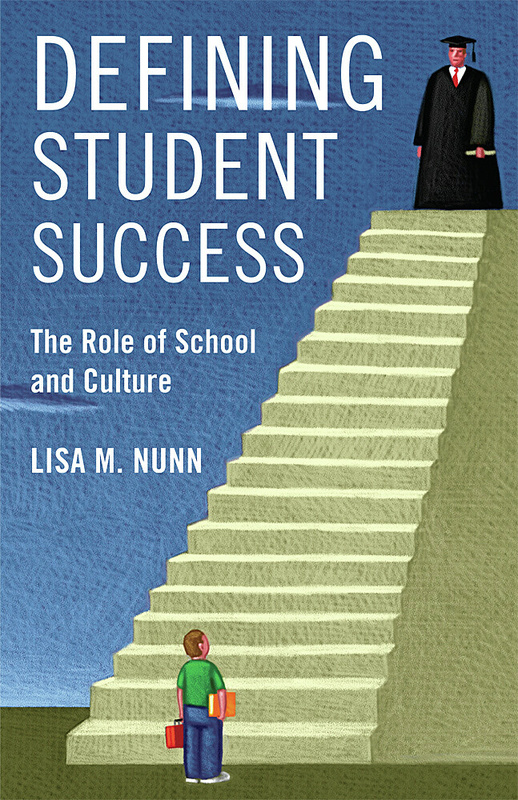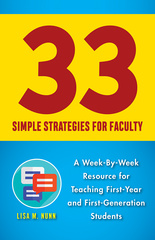2020 Scholarly Contributions to Teaching and Learning Award from the ASA
The key to success, our culture tells us, is a combination of talent and hard work. Why then, do high schools that supposedly subscribe to this view send students to college at such dramatically different rates? Why do students from one school succeed while students from another struggle? To the usual answer—an imbalance in resources—this book adds a far more subtle and complicated explanation. Defining Student Success shows how different schools foster dissimilar and sometimes conflicting ideas about what it takes to succeed—ideas that do more to preserve the status quo than to promote upward mobility.
Lisa Nunn’s study of three public high schools reveals how students’ beliefs about their own success are shaped by their particular school environment and reinforced by curriculum and teaching practices. While American culture broadly defines success as a product of hard work or talent (at school, intelligence is the talent that matters most), Nunn shows that each school refines and adapts this American cultural wisdom in its own distinct way—reflecting the sensibilities and concerns of the people who inhabit each school. While one school fosters the belief that effort is all it takes to succeed, another fosters the belief that hard work will only get you so far because you have to be smart enough to master course concepts. Ultimately, Nunn argues that these school-level adaptations of cultural ideas about success become invisible advantages and disadvantages for students’ college-going futures. Some schools’ definitions of success match seamlessly with elite college admissions’ definition of the ideal college applicant, while others more closely align with the expectations of middle or low-tier institutions of higher education.
With its insights into the transmission of ideas of success from society to school to student, this provocative work should prompt a reevaluation of the culture of secondary education. Only with a thorough understanding of this process will we ever find more consistent means of inculcating success, by any measure.
The key to success, our culture tells us, is a combination of talent and hard work. Why then, do high schools that supposedly subscribe to this view send students to college at such dramatically different rates? Why do students from one school succeed while students from another struggle? To the usual answer—an imbalance in resources—this book adds a far more subtle and complicated explanation. Defining Student Success shows how different schools foster dissimilar and sometimes conflicting ideas about what it takes to succeed—ideas that do more to preserve the status quo than to promote upward mobility.
Lisa Nunn’s study of three public high schools reveals how students’ beliefs about their own success are shaped by their particular school environment and reinforced by curriculum and teaching practices. While American culture broadly defines success as a product of hard work or talent (at school, intelligence is the talent that matters most), Nunn shows that each school refines and adapts this American cultural wisdom in its own distinct way—reflecting the sensibilities and concerns of the people who inhabit each school. While one school fosters the belief that effort is all it takes to succeed, another fosters the belief that hard work will only get you so far because you have to be smart enough to master course concepts. Ultimately, Nunn argues that these school-level adaptations of cultural ideas about success become invisible advantages and disadvantages for students’ college-going futures. Some schools’ definitions of success match seamlessly with elite college admissions’ definition of the ideal college applicant, while others more closely align with the expectations of middle or low-tier institutions of higher education.
With its insights into the transmission of ideas of success from society to school to student, this provocative work should prompt a reevaluation of the culture of secondary education. Only with a thorough understanding of this process will we ever find more consistent means of inculcating success, by any measure.
In Defining Student Success, Nunn demonstrates that she is a careful and nuanced writer who brings life and character into her discussion of how ideas about success are negotiated within the schools she studied.'
Beautifully done. Lisa Nunn deftly shows how particular high schools refract American ideals of merit, hard work, and intelligence in ways that encourage some students toward elite colleges and nudge many others toward alternate futures. Nunn’s careful ear and sophisticated analysis combine for an especially thoughtful sociology of aspiration.
This book provides readers with a valuable framework for understanding the enculturation of academic values in different types of secondary schools. The volume’s rich descriptions and structured comparisons allow for thoughtful deliberation of what would be an optimal school message and mission for adolescents with different backgrounds, academic abilities, and aspirations. Recommended.
Overall, Defining Student Success is itself a success.Lisa Nunn has written a book that is theoretically grounded, empirically detailed, and fills important gaps in what we previously knew about the relationships between institutions, student identity, and education.
LISA M. NUNN is an assistant professor of sociology at the University of San Diego.
Acknowledgments
Introduction: Three High Schools with Three Distinct Ideas about School Success
1. Alternative High: Effort Explains School Success
2. Fearing Failure at Alternative High
3. Comprehensive High: Effort Is Helpful, but Intelligence Limits School Success
4. Separate Worlds, Separate Concerns: AP versus “Regular” Track at Comprehensive High
5. Elite Charter High: Intelligence Plus Initiative Bring School Success
6. Competitive Classmates at Elite Charter High
7. Beyond Identity: Consequences of School Beliefs on Students’ Futures
Appendix A: Identity Theory and Inhabited Institutionalism
Appendix B: Methodology: Interviewing Students about Success Identity
Afterword
Notes
Bibliography
Index
Introduction: Three High Schools with Three Distinct Ideas about School Success
1. Alternative High: Effort Explains School Success
2. Fearing Failure at Alternative High
3. Comprehensive High: Effort Is Helpful, but Intelligence Limits School Success
4. Separate Worlds, Separate Concerns: AP versus “Regular” Track at Comprehensive High
5. Elite Charter High: Intelligence Plus Initiative Bring School Success
6. Competitive Classmates at Elite Charter High
7. Beyond Identity: Consequences of School Beliefs on Students’ Futures
Appendix A: Identity Theory and Inhabited Institutionalism
Appendix B: Methodology: Interviewing Students about Success Identity
Afterword
Notes
Bibliography
Index














